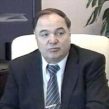
KREMLIN PLAN TO MERGE ADYGEYA MEETS UNEXPECTED OBSTACLE
Publication: Eurasia Daily Monitor Volume: 3 Issue: 67
By:

On April 4, the second session of the newly elected parliament of Adygeya, a region in the western section of the North Caucasus, ended abruptly when President Khasret Sovmen announced his resignation.
The Adygei leader had come to parliament to observe the process to select the chairmen of 12 parliament committees. Fierce debate erupted between members of the pro-Kremlin United Russia Party, which has 30 seats in the Adygei legislature, and the opposition Communist and Russian United Industrial Parties, which have a total of 13 seats. Sovmen asked for the floor, presumably to broker a compromise. However, parliamentary chair Ruslan Khadzhibekov refused to allow the Adygei leader to speak. Then Sovmen handed the speaker a written statement. But instead of reading it aloud, Khadzhibekov said that the statement would first be reviewed by the Political Council of United Russia; both Sovmen and Khadzhibekov are members of the pro-Kremlin party.
Despite the speaker’s obvious resistance, Sovmen managed to take the floor following a break. His speech stunned the assembled deputies. “I have decided to resign,” he declared. “Moscow does not understand me. Even if I step down from the president office, I will provide the republic with economic and social help.” Sovmen wished the parliament good luck and suggested possible successors, including Adam Zhane, minister of health, and Murad Kudaev, the head of Adygeya’s Krasnogvardeisk district (Kommersant, April 5).
Sovmen left the parliamentary chamber after his speech, accompanied by several loyal deputies. According to Kommersant, Sovmen went to the Government Palace to await a phone call from the Kremlin. He did not have to wait for long; the phone call from Moscow came within 30 minutes and radically changed the situation.
Following Sovmen’s conversation with Moscow, the Adygei presidential office issued a press release. “The deputies and journalists misunderstood the statement made by the president,” it read. “There are no grounds for broadcasting information about his resignation.” According to press secretary Abrek Chich, “The president reacted too emotionally to what was going on during the session. When he entered the parliament, some deputies defiantly did not stand up and when Khasret Sovmen saw that the deputies had no common ground and synergy, he announced that there was no use trying to work with such an attitude.”
Several hours later the United Russia parliamentary faction held a special meeting and appealed to Russian President Vladimir Putin to extend Sovmen’s authority by another term.
The next day, April 5, the political crisis in Adygeya took a disturbing turn: Sovmen disappeared. Vedomosti reported that even officials from Putin’s administration were unable to locate him. An unnamed source in Putin’s administration described Sovmen’s behavior as “unclear vacillation that destabilizes the situation in the region.” The source also said that Sovmen’s resignation might be accepted as early as the end of this week (Vedomosti, April 5). However, another source in the Kremlin left open the possibility that Putin would reappoint Sovmen (Kommersant, April 5).
Russian pundits offered a variety of explanations for Sovmen’s demarche. Kommersant reported that the Kremlin was dissatisfied with Sovmen’s economic policy and that he was resisting a proposal to incorporate Adygeya into Krasnodar Krai, which is dominated by ethnic Russians (see EDM, April 29, 2005). According to political observer Oksana Goncharenko, “The danger now is that the local parliament will split into equal parts, including followers and opponents of Sovmen” (Novye izvestiya, April 5). The opposition, consisting mostly of ethnic Russians, advocates holding a referendum in Adygeya on the issue of unification. This would be the easiest way for the Kremlin to dissolve Adygeya, as the majority of the population in the republic consists of Russians who would vote for such unification. According to Alexander Konovalov from the Institute of Strategic Estimates and Analyses, the president of Adygeya was called to Moscow where attempts were made to persuade him to agree to the unification. Instead, he went to parliament to resign in protest.
The new Adygei parliament, elected on March 12, has only one chamber, unlike the previous body. It will be much easier to push the referendum law through a unicameral parliament, which had been blocked by the upper chamber of the old legislature. Adopting the referendum law opens the door for unification, which the Kremlin has long tried to engineer. Parliamentary speaker Khadzhibekov is loyal to the Kremlin and will not resist Adygeya’s incorporation into Krasnodar Krai. Relations between Khadzhibekov and Sovmen are strained, because Moscow sees Khadzhibekov as the region’s next president. This explains why Khadzhibekov did not let Sovmen speak first at the session and why the Adygei leader mentioned two regional politicians as his preferred successors. Understanding that the Kremlin wants to get rid of him to clear the way for the merger, Sovmen decided to play an all-or-nothing game, knowing that Moscow has not yet decided what to do with him and with Adygeya. The Adygei president’s bold move may have been intended to frighten Putin, who often moves tentatively to avoid making missteps.
Sovmen’s open threat to resign demonstrated that the Adygei leader continues to be an independent regional political figure, a quite rare species in Putin’s Russia. But Sovmen must act boldly, as the Adygei people would not forgive him if he betrays the idea of Adygeyan autonomy.




